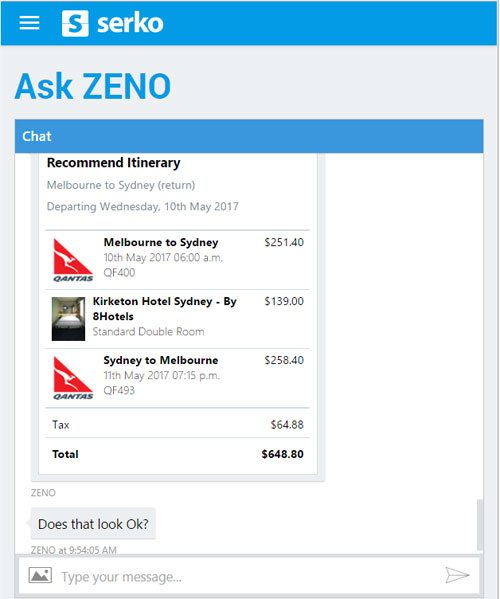Skift Take
Corporate-booking technology vendors Serko and Concur plan to add natural language bots to their tools. Other players are likely to follow.
Serko, a corporate travel booking and expense management business, is like a baby, Kiwi version of Concur, the SAP-owned technology company that is a developer of software that help businesses manage travel expenses.
Subscribe to the Corporate Travel Innovation Report
Serko’s travel booking tool is used by more than 60 percent of enterprise businesses in Australia and New Zealand. The world’s largest travel management companies (namely, BCD Travel, American Express Global Business Travel, Carlson Wagonlit Travel, and Hogg Robinson Group) all resell Serko’s tool to their customers in Asia Pacific. Flight Centre, operating under its Corporate Traveller and Flight Center Business Travel brands, also does.
So it is of regional significance that Serko plans to unveil a fresh travel-and-expense management platform with artificial intelligence (AI) baked in.
In July 2017, the company will release a corporate online booking user interface as an optional premium solution alongside its booking tool for its 3 million users. This Zeno tool uses AI to be able to interpret natural language queries and simplify self-managed travel bookings.
Zeno builds on the predictive booking mobile app for iPhone and Android that Serko has been testing since September. It adds a layer of AI to what’s happening on the apps in a move that should speed up the booking process.
Zeno looks at the booking behavior of clients who use its online booking tool to suggest flight and hotel recommendations that reflect travelers’ habits and their company’s rules.
There’s a lot to critique. Serko’s PR hype may outstrip what it can deliver with a product that seems deeply imperfect in its preview version, even though investments are ongoing.

While it is true that, if its educated guesses are correct, Zeno could speed up the time it takes a traveler to complete a booking on tiny mobile device screens, the opposite is also true: Bad suggestions can be especially irritating to have to fix on a small mobile device.
Darrin Grafton, cofounder and chief executive of Serko, predicts that someday, a traveler might use Zeno via their preferred voice-activated Internet tool, such as Amazon Alexa or Google Home, or a chat-based tool like Skype or Slack, to ask for help in booking a trip.
If the business traveler typically flies Air New Zealand between Auckland and Wellington at similar times of day, then Zeno would automatically propose a comparable itinerary for the traveler’s next trip. It would even check the traveler’s online calendar to avoid conflicts and to make sure an itinerary coincided with key scheduled events at a destination.
Yet a large chunk of future business travel is not easily divined from past patterns. And such repetitive trips aren’t that taxing for travelers or their assistants to book as it is.
In short, the vision is many years away for technologists to solve. The complexity is large.
Judge for yourself. Here’s a video demonstration from the company:
INDUSTRY-WIDE TESTING
Flaws aside, Serko’s product goal reflects a broader aspiration that the whole industry is mulling.
Larger rival Concur has been at work on incorporating AI into its own services. As Concur president Mike Eberhard told Skift last week, “For us to be able to serve up the right answers for a travel search that isn’t just based on current parameters but takes into consideration previous behavior is very powerful.”
In January, Concur began beta tests of a bot for the Slack messaging service that lets users send requests or questions about their travel plans or expenses to Concur’s system. It is testing the bot with select customers and demonstrating it at the company’s customer conference this week. The company’s doing the same for Amazon Echo, a voice-powered computer.

Other corporate travel players are experimenting with consumer-grade interfaces and AI-powered technology, too.
In the past year, American Express Global Business Travel acquired corporate travel technology firm KDS to “help shore up its focus on creating a better set of online booking tools for its clients,” as we reported at the time. The company has also been investing in its mobile app. (For more context, read last month’s survey article, “To Understand Personalization, Corporate Travel Looks to Consumer Travel.”)
Startups are competing to build similar technology, too. Tradeshift Go, for instance, is an AI-powered virtual assistant for payments, expense management, and travel booking that launched last summer.
Meanwhile the startup Olset, which had developed a hotel recommendation service based on machine learning, was acquired by business travel company Deem late last year.
The companies see an overlapping vision of future technological uses.
Grafton says Serko is offering different interfaces to present information in relevant ways for varied types of travelers.
“What we’ve been stuck with, in the corporate space, is having one user interface for all types of users,” says Grafton. “Our goal is to provide different interfaces for different types of users.”
“Zeno, for instance, uses reactive design,” Grafton says. “The user interface changes based on the device the traveler is using and the type of booking being done.”
His goal is for travel managers to use natural language to authorize a booking and upload and manage expenses — something as of yet unheard of in corporate travel, of which it is currently processing about $6 billion a year in transaction volume.
Serko’s and Concur’s experiments could percolate throughout the global ecosystem. The path is there. For example, in the past year, the technology wholesaler has begun to replace the proprietary online booking tool that global travel technology company Sabre offers its thousands of corporate customers with a new tool based on Serko’s Enterprise booking platform, starting in Asia-Pacific.
It will likely take far longer for companies like Serko and Concur to crack the AI code, but once they do, it may take a surprisingly short time for their tools to become standard.
Skift AI Travel Newsletter
AI coverage across travel sectors that’s focused on separating trendy moves from good ideas – in your inbox every Friday.
Have a confidential tip for Skift? Get in touch
Tags: artificial intelligence, australia, booking
Photo credit: Workers at Auckland-based Serko, a seller of corporate travel booking tools, are inventing chat-based services that are powered by artificial intelligence. Serko
